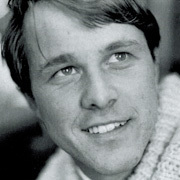
Leo Shelton
Leo Shelton joined the NZ Broadcasting Corporation in Wellington in 1967, after time as a stills photographer in Palmerston North. Adept at framing, lighting, developing and enlarging, but bored with weddings, he was wanting a new challenge.
Shelton was interviewed by Waynne Williams, then head of the film camera section, and Ken White, who was in overall charge of film operations. They were impressed and Shelton was taken on as a trainee film cameraman.
Training lasted a year. “We were quite protective back then,” Williams says. “We wouldn’t let anyone touch a camera for the first few months in case they took off and all the training was wasted." At the end of that first year, trainees – as was the case across all broadcasting in those days — were sent out of Wellington, the main hub, to develop their skills in the provinces. But Shelton stayed in the Capital. “He was too good,” Williams says. “We wanted to keep him.”
In those early years, Shelton worked across the whole TV programming spectrum — news, sports, current affairs, documentaries and dramas – on productions like Country Calendar, Town and Around, early NZBC pictorial magazine Looking at New Zealand, and acclaimed drama The Killing of Kane.
It was around this time that Shelton changed his name by deed poll. Originally Leo Schouten, brother of former journalist Henk, he’d become increasing annoyed by the misspellings and mispronounciation of his surname. Mail would arrive addressed to 'Leo Skooten'. 'Shelton' was a simpler option, although it did lead to some teasing, with colleagues calling him 'Lindsay' after then news editor Lindsay Shelton.
In 1971 Shelton took off on his OE, stopping off in South Africa. He soon found work in the busy film industry there, first in the sound department, then as a camera operator on a number of feature-length dramas. But Shelton’s sense of fair play was always going to be compromised by the apartheid system. Eventually, frustrated at the treatment and working conditions of many of his co-workers, he returned to Aotearoa, where television was having a growth spurt of its own.
Through the rest of the 70s and 80s Shelton worked on a wide range of programmes, including dramas like the early sci-fi mini-series Epidemic and Children of Fire Mountain, and Mortimer’s Patch.
Pamela Meeking-Stewart’s award-winning Pioneer Women series was just one of the many documentaries Shelton worked on. He also shot for director/producer Peter Coates on programmes about Brian Brake, Witi Ihimaera, and the All Blacks, and travelled to Barcelona to cover the 1992 Paralympics.
Shelton was always a perfectionist, and expected the same from those he worked with. On occasion he could be seen as stubborn, but if he felt his work and the production were being respected then he’d pull out all the stops.
Appointed as Head of Cameras in TVNZ’s Wellington newsroom, Shelton gained a reputation for being a good manager and an even better mentor. “He was a great boss,” remembers cameraman Stephen Press, who spent several years in the newsroom. When mistakes were made, “he wouldn’t admonish, he’d just ask “Stephen, what happened? You’ll talk it through and work out how to do it better next time. He inspired a lot of camera operators to take it to the next level.”
Leo Shelton died suddenly on 9 May 2017, at the age of 70. In screen industry mag NZTecho magazine, cinematographer Peter Janes wrote of being trained by, and in awe of, Shelton. “Leo was generous with his advice and praise," wrote Janes. "I remember him once saying that I was a better cameraman than him. It made me feel pretty special at the time, even though it wasn’t true.”
Profile written by Doug Coutts
Published on 25 January 2018
Sources include
Stephen Press
Waynne Williams
Peter Janes, 'In Memory Of Leo Shelton 1947 - 2017' - NZ Techo issue 74, page 18 (Spring 2017)